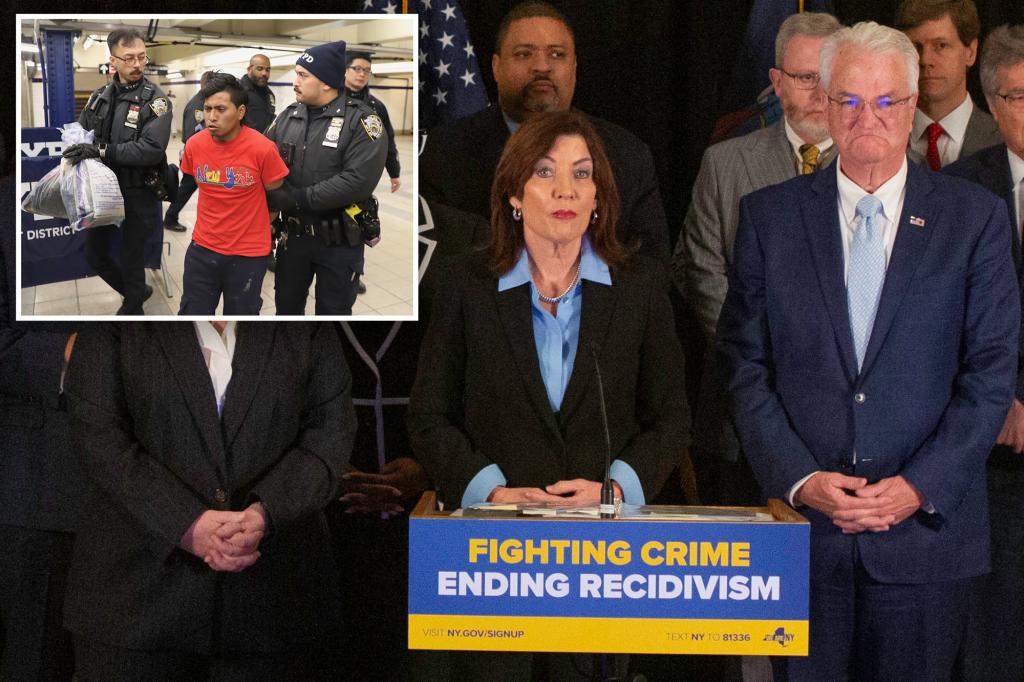Paragraph 1: The Revolving Door of Justice and the Need for Reform
New York Governor Kathy Hochul, flanked by a united front of New York City district attorneys, is spearheading a legislative push to amend the state’s discovery laws. The proposed changes aim to address what Hochul and prosecutors describe as a "revolving door" of justice, where accused individuals are released on technicalities related to evidence disclosure, only to re-offend. This bipartisan coalition, ranging from Manhattan DA Alvin Bragg to Staten Island DA Michael McMahon, underscores the urgency of the situation and the shared concern across the political spectrum about the perceived loopholes in the current law. The core issue lies in the 2019 criminal justice reforms, which, while intended to enhance fairness, have inadvertently created opportunities for cases to be dismissed based on procedural errors rather than the merits of the evidence.
Paragraph 2: The Proposed Changes to Discovery Procedures
The centerpiece of Hochul’s proposal, embedded within her expansive budget plan, involves establishing a 35-day time limit for defense attorneys to challenge alleged discovery violations. This clock would begin ticking once prosecutors submit a "certificate of compliance," affirming that all required evidence has been provided. Currently, defense attorneys can raise these challenges at any point, sometimes even after receiving the evidence, which prosecutors argue incentivizes gamesmanship. The reforms would also narrow the scope of discoverable materials. Currently, prosecutors must turn over “all items and information that relate to the subject matter of the case,” a broadly worded requirement that has proven burdensome. Hochul’s proposal would limit this to evidence directly related to the specific charge, reducing the volume of potentially irrelevant information exchanged. Furthermore, the reforms would require defendants to demonstrate actual prejudice or harm resulting from a discovery violation to justify dismissal. This change aims to prevent dismissals based on minor technicalities that do not impact the defendant’s ability to mount a defense. Finally, judges would be granted the flexibility to impose sanctions other than dismissal for discovery violations, providing a more nuanced approach to addressing procedural errors.
Paragraph 3: Case Studies Highlighting the Perceived Flaws in Current Law
Several cases have become emblematic of the perceived flaws in the current discovery laws. Governor Hochul highlighted a subway slashing case where the accused was released due to a minor technicality related to the timely disclosure of the victim’s medical records, even though the undisclosed information was ultimately immaterial. Another case involving forcible touching and sex abuse charges was dismissed due to the delayed disclosure of routine custody forms, unrelated to the core allegations. These examples, along with numerous others involving charges ranging from drunk driving to domestic violence, underscore the concern that the current system prioritizes procedural perfection over substantive justice. Prosecutors argue that these dismissals not only undermine public safety but also erode public trust in the criminal justice system.
Paragraph 4: Statistical Evidence and the Debate over Dismissal Rates
Data from the Office of Court Administration reveals a stark increase in criminal case dismissals in New York City since the 2019 reforms. Dismissals rose from 41% pre-reform to 62% in 2023. Prosecutors attribute this surge to the stricter discovery requirements, arguing that they are overwhelmed by paperwork and vulnerable to dismissals based on minor procedural missteps. Critics of the proposed changes, such as The Legal Aid Society, contend that these statistics are cherry-picked and that the reforms have been successful in ensuring fairness. They argue that the proposed amendments are a veiled attempt to restore a system that previously favored the prosecution. This clashing interpretation of the data highlights the fundamental disagreement about the impact of the 2019 reforms and the appropriate balance between procedural safeguards and efficient prosecution.
Paragraph 5: Political Landscape and the Path Forward for Reform
Hochul’s proposed changes face an uncertain future in the state legislature. While she has secured the support of a bipartisan coalition of district attorneys, including the traditionally liberal Manhattan DA Alvin Bragg, the proposal is likely to encounter resistance from progressive lawmakers who championed the 2019 reforms. Previous attempts by Hochul to modify bail laws met with staunch opposition, resulting in a legislative stalemate. The Legal Aid Society’s vocal criticism further signals the potential for a protracted political battle. While Senate Majority Leader Andrea Stewart-Cousins has expressed openness to discussion, this does not guarantee legislative action. The stance of Assembly Speaker Carl Heastie remains unknown, adding to the uncertainty surrounding the proposal’s prospects.
Paragraph 6: Perspectives from Legal Professionals and Potential Alternatives
The proposed reforms have elicited mixed reactions from legal professionals. Some trial lawyers acknowledge the proposal as a positive step towards addressing discovery issues but argue that it does not go far enough. Others suggest more drastic alternatives, such as decoupling discovery requirements from speedy trial rules, particularly for misdemeanors and violations. This would significantly limit the ability of judges to dismiss cases based on discovery challenges. Even within the pro-reform camp, there is a recognition that the 2019 changes went too far in some respects. The challenge for lawmakers will be to find a compromise that addresses the concerns of prosecutors while preserving the fundamental principles of fairness and due process. The debate ultimately revolves around striking the delicate balance between ensuring a fair trial for the accused and protecting public safety by holding perpetrators accountable.

